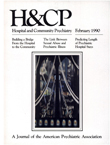Follow-up of Community Placement of the Chronic Mentally Ill in New South Wales
Abstract
A total of 208 long-stay hospital patients in New South Wales, Australia, who were discharged to supported community accommodations were studied to determine their adjustment in the community. For 172 patients, measurements were obtained of the patients' satisfaction with their accommodations, the caretakers' perceptions of the patients' impairment and management difficulty, and the restrictiveness of practices in the various accommodations. Most patients were considered to be functioning well, although 22 of the more impaired and difficult patients were rehospitalized at the time of the study. Seventy-eight percent of the patients preferred living in the community, and only 7 percent preferred a hospital. The patients benefited from the supported, subsidized, permanent bousing available in the community and required low levels of mental health care.
Access content
To read the fulltext, please use one of the options below to sign in or purchase access.- Personal login
- Institutional Login
- Sign in via OpenAthens
- Register for access
-
Please login/register if you wish to pair your device and check access availability.
Not a subscriber?
PsychiatryOnline subscription options offer access to the DSM-5 library, books, journals, CME, and patient resources. This all-in-one virtual library provides psychiatrists and mental health professionals with key resources for diagnosis, treatment, research, and professional development.
Need more help? PsychiatryOnline Customer Service may be reached by emailing [email protected] or by calling 800-368-5777 (in the U.S.) or 703-907-7322 (outside the U.S.).



